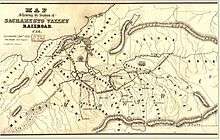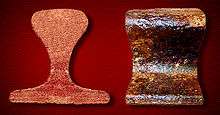Sacramento Valley Railroad (1852–77)

The Sacramento Valley Railroad was the first transit railroad company in California to file papers of incorporation on August 4, 1852 although it was not the first to become operational. The railroad's gauge was 5 ft 3 1⁄2 in (1,613 mm), (7 inches (180 mm) wider than 4 ft 8 1⁄2 in (1,435 mm) standard gauge) and was laid with 60-pound-per-yard (29.8 kg/m) Welsh iron "pear" rail.
Original route

The original plans called for the railroad to run from Sacramento to Marysville by way of Folsom. These plans never fully materialized as the railroad was only built from Sacramento to Folsom. The Sacramento Valley Railroad ran from the Sacramento River levee at Front and "L" Street in present-day Old Sacramento and terminated at Folsom. On February 22, 1856, the first train operated over the entire 22.9-mile (36.9 km) line. Thus the line is not the oldest working railroad in the state; the Arcata and Mad River Railroad had been operational since December 15, 1854.[1]:41
The first president of the Sacramento Valley Railroad was future American Civil War General William Tecumseh Sherman. Theodore Judah was the Chief Engineer of the Sacramento Valley Railroad. Judah would later become the Chief Engineer of the Central Pacific Railroad and the chief proponent of the first transcontinental railroad over the Sierra Nevada by way of Dutch Flat.
On April 19, 1877, the Sacramento Valley Railroad was consolidated with the Folsom and Placerville Railroad to form the Sacramento and Placerville Railroad. In 1877 the Placerville and Sacramento Valley Railroad was also deeded to the Sacramento and Placerville Railroad. The new railroad operated over 49.1 miles (79.0 km) of track between Sacramento and Shingle Springs.
The railroad eventually came under the control of the Southern Pacific Railroad (SP); first under SP's subsidiary, the Northern Railway in 1888, and then ten years later under the SP on April 14, 1898.
The route as it exists now
Today much of the original route still exists and was the former Placerville Branch of the Southern Pacific. Today it is used by Union Pacific Railroad and extends to the Aerojet facility just west of Folsom. The Sacramento RTD Gold Line light rail line parallels the route and uses the right of way between Sacramento and Folsom.
Most of SVR's planned route was built by subsequent railroad companies after 1869. A notable historic section is still in operation today as Niles Canyon Railway that linked Sacramento to the San Francisco Bay Area through Niles, California.
See also
References
- ↑ Katy M. Tahja (2013). Logging Railroads of Humboldt and Mendocino Counties. Arcadia Publishing. pp. 33–. ISBN 978-0-7385-9621-1.
Additional reading
- Fickewirth, Alvin A. (1992). California railroads: an encyclopedia of cable car, common carrier, horsecar, industrial, interurban, logging, monorail, motor road, shortlines, streetcar, switching and terminal railroads in California (1851-1992). San Marino, CA: Golden West Books. ISBN 0-87095-106-8.